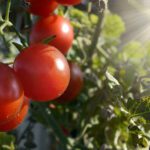Vegetables are edible vegetables whose cultivation is carried out in orchards. These are plants valued for their nutritional qualities, as well as for their flavor that are part of the human diet. Vegetables are the group of plants grown in orchards.
It is consumed as food raw or cooked through different preparations. Includes vegetables, green legumes (broad beans, chickpeas, beans, among others) and peas (peas). Unlike fruit, it is not sweet, but salty. Vegetables are very important for food and good nutrition of the family, their leaves, fruits, roots, stems and flowers are consumed to meet the needs of our body, due to their high content of minerals, vitamins and proteins that help improve and maintain good health.
Potassium
Potassium is an abundant element in nature (in terms of cations, it is the most abundant), which is often detected at high concentrations, greater than 150 ppm, in chemical soil analyses. It is a mobile element in the plant; We will hardly see symptoms of deficiency of this element in new leaves, this is due to the fact that Potassium is highly soluble, it does not bind easily to the lignin of the plant and, above all, because it moves in high concentrations through the phloem (sieve tubes ) along with Nitrogen and Phosphorus, quite unlike elements such as Calcium that are not mobile via sieve tubes and for that reason accumulate in mature leaves and are lacking in new leaves.
Potassium performs very important functions for plants. It activates more than 50 enzyme systems, among which oxidoreductases, dehydrogenases, transferases, synthetases and kinases stand out. One of its main functions in cells is osmoregulation. It is involved in the opening and closing of stomata, this is vital for the correct absorption of carbon and evapotranspiration of the plant (and therefore for the movement of the flow of water and nutrients in the xylem), hence in periods of stress by drought or low temperatures, its concentration in the cell is very important. Other functions of this element is to give strength to the roots, its presence increases resistance to pathogen attack.
In the production of fruit vegetables, grains and fruit trees it plays a vital role. Potassium, being responsible for the osmoregulation of cells, regulates the passage of water to other organs of the plant (more water, more weight, sugars, hormones and nutrients for the fruit) but there is also a phenomenon not yet fully described in which, within the phloem, Potassium allows the movement of sucrose and other sugars, essential compounds to achieve fruit quality (uniform ripeness, sweetness, etc.).
In summary, Potassium helps the plant to have resistance to the attack of pathogens in the soil, promotes water balance in plants, vital in periods of stress due to drought and low temperatures, and allows the filling of fruits, with greater weight. and quality.
FRUTI-K® is a product designed and oriented to improve the growth, development and tying of fruit in fruit trees and providing greater caliber, hardness, consistency and capacity for conservation and transport. Its formulation allows to complement the nutrition in the mentioned crops given its high and balanced concentration of Nitrogen, Phosphorus, Potassium, Sulphur, Zinc and Boron, elements demanded in stages of growth, development and fruit set.
FRUTI-K® supports giving:
- Greater nutritional and physiological stimulus.
- Greater foliar surface and assimilation of photosynthates.
- Development of leaves and stems of greater quantity.
- Greater assimilation of nutrients.
- Formation of vascular tissue (xylem).
- Better development and mooring of fruits and seeds.
- Plant structure more tolerant under stress conditions.
 AgronoBlog – Agriculture Blog
AgronoBlog – Agriculture Blog 
